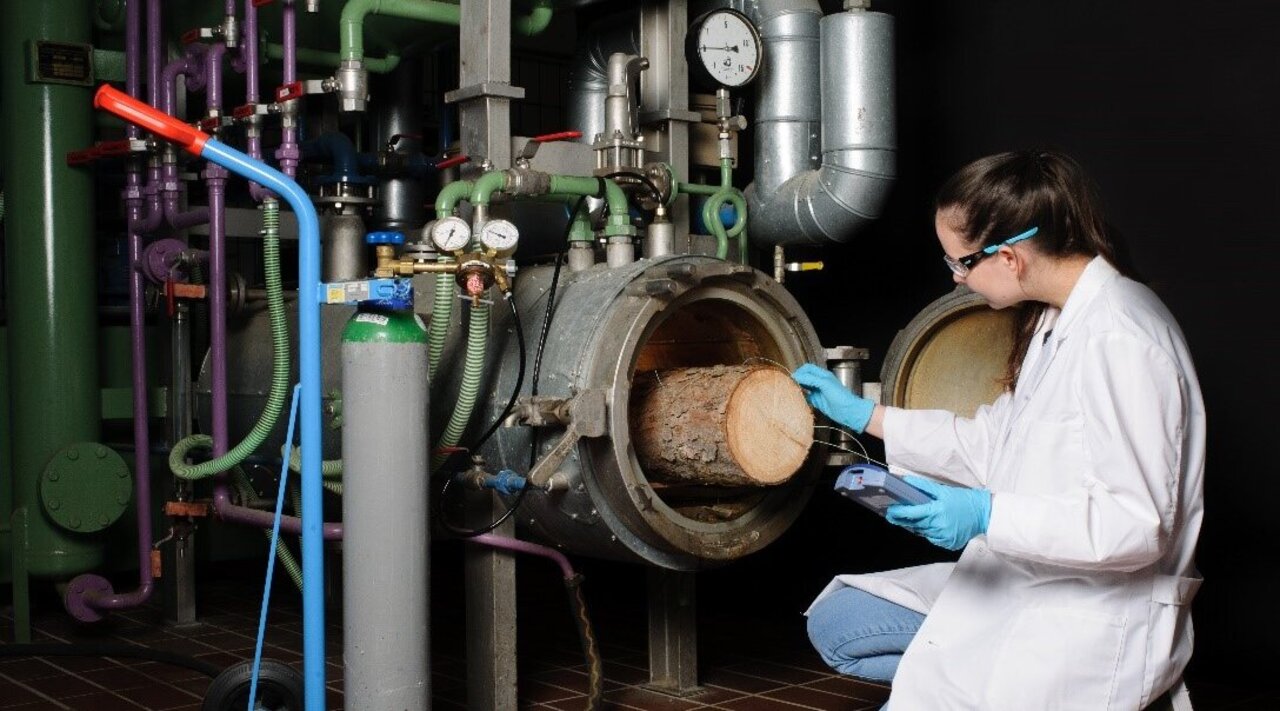Project
Climate-neutral fumigation and alternative treatment for log exports

Climate-neutral fumigation processes and alternative treatment methods for logs for export
Log export requires the killing of harmful organisms. For this purpose, sulphuryldifluoride is usually used. Alternative processes are available. Comparative studies should show efficiency or climate friendliness.
Background and Objective
The transcontinental export of roundwood requires phytosanitary treatment to prevent the spread of harmful organisms. Currently, fumigation with sulphuryldifluoride (SF) is usually used for this purpose. Current practice is to release the gas into the atmosphere after treatment. The problem here is that SF - in addition to the greenhouse gases listed in the Climate Protection Law (Klimaschutzgesetz, KSG) - is considered to have a strong impact on the climate. And it has a warming potential around 4800 times greater than carbon dioxide. In view of the continuous release of SF and its real effect as a greenhouse gas, a changeover to more climate-friendly chemicals or alternative treatment methods with a favourable ecological balance would be desirable. This is particularly true against the background of the sharp increase in exports of calamity wood in recent years, which was associated with a sharp increase in the consumption of SF.
Approach
In cooperation, the Thünen Institute for Wood Research (Thünen-Institut für Holzforschung, TI-HF) and the Julius Kühn Institute (JKI) are conducting research with the aim of being able to reduce emissions of the climate-relevant gas SF during pest control in the context of wood exports in the future. The JKI is working out the limits of the parameters ˈtemperatureˈ and ˈdurationˈ in SF treatment for which killing of the harmful organisms is still assured. The TI-HF prepares life cycle assessments for selected parameter combinations, which then serve as a reference value when comparing the environmental impact of the alternatives investigated. Furthermore, the JKI conducts experiments with toxic gases (such as monophosphane), while at the TI-HF experiments are conducted with nitrogen and carbon dioxide (including under pressure). In addition to gas treatment, water storage and heat/steam treatment as well as the combination of gas and heat treatment are investigated and optimised at the TI-HF. The spectrum of efficacy of the treatments is assessed with microbiome analyses, among other things. The practical possibilities and limits of the alternatives are discussed in economic feasibility studies. The results of the microbiome analyses, i.e. a possibly broader spectrum of efficacy of certain methods, could make existing additional costs bearable.
Thünen-Contact

Involved Thünen-Partners
Involved external Thünen-Partners
- Julius Kühn-Institut - Bundesforschungsinstitut für Kulturpflanzen (JKI)
(Quedlinburg, Braunschweig, Groß Lüsewitz, Kleinmachnow, Deutschland)
Funding Body
-
Federal Ministry of Agriculture, Food and Regional Identity (BMLEH)
(national, öffentlich)
Duration
9.2022 - 12.2025
More Information
Project status:
ongoing








